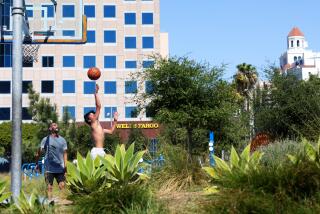Beyond South-Central
When Danny Bakewell Sr. bought a controlling interest in the Los Angeles Sentinel in March, that didn’t surprise those who have followed his colorful career. The new executive publisher and CEO of the weekly billed as the West Coast’s oldest black-owned newspaper is a heavy hitter in local real estate development. He also heads the Los Angeles Brotherhood Crusade, a nonprofit consortium of charitable and self-help groups, where his activism has earned him the moniker “The Godfather of South-Central,” along with his share of controversy and litigation. Bakewell, 57, is starting a new chapter with the Sentinel, founded by Leon Washington Jr. in 1933.
Why do you want to be a newspaper publisher?
I don’t know that I did this because I really want to be a newspaper publisher as much as I seized an opportunity that was presented to me by [prior Sentinel owner] Jennifer Thomas, who invited me. It’s an awesome responsibility to be able to influence black thought and to help people clarify and crystallize issues that are important to us. I’m certainly not the traditional publisher, but I do intend to be a good publisher and a publisher to be reckoned with.
The neighborhoods served by the Sentinel are becoming more Latino. Can the paper still aim at African American readers?
All of California has changed. This is not just true of the African American community. But our numbers are not diminishing. South-Central Los Angeles used to be a boundary of Watts. Now you’ve got to connect the dots to people living in Mar Vista and Pacoima and Orange County and Westlake, Compton, Inglewood, Lynwood, Gardena, Rancho Cucamonga, San Bernardino. Lots of black people are living in those communities. We’ve got to look at our distribution and make sure we’re in all the barbershops and liquor stores in those communities. We’ve got to make sure we’re in front of the city halls in those places and the post offices. I’m talking with Magic Johnson right now about a program to put the Sentinel in all of the Starbucks that he owns. I’m excited about it.
What stories are underexposed in South-Central?
We’re not the priority for the mainstream media. I want to put the pressure on. They ought to be looking at the Sentinel and asking, “Why didn’t we cover that? It’s a big story.” We’ve had police brutality running rampant in our communities for decades. Let’s listen to car-to-car and person-to-person [communications]. Let’s go read the reports. We intend to really put a face and a feeling to the kind of hunger and pain that the black community has been enduring and in some instances are still enduring.
Your roots in Los Angeles go back how far?
I came out [from New Orleans] in 1965 just to get a job. I [had] applied for a job on the front desk in a [New Orleans hotel]. Someone told me, “I’m sorry, we don’t hire coloreds.” My father was here [in Los Angeles]. My mother and father were divorced. I was married, I had a child. I started waiting tables at the Friars Club in Beverly Hills. Then I went on to work in the community and found my way.
How did you get involved in community work?
My father was a brick mason, contractor and subcontractor. He eventually opened a restaurant, then opened a liquor store and ultimately got killed in a shopping center I bought later in Compton. When I [say] we’ve got to stamp out violence against each other, I’ve suffered the consequences of that, but I’ve also enjoyed a great life. The community has been far greater to me than I’ve been to it.
Will you continue to be involved with real estate development? Could that pose a potential conflict for a newspaper publisher?
I don’t see it at all. I’m even surprised by the question. I don’t think I’ll be acting any differently than the publisher of the L.A. Times or the Daily News. We’re going to be held to the same standard of being ethical, being morally correct and running a level of journalism that is professional and that has extraordinary aggression as it comes to defining the quality of life.
Do you see the Sentinel as an asset to build up and sell?
My grandfather used to be a janitor at the Times-Picayune in New Orleans. My father used to be a paperboy. My mother used to sell newspapers--she was a garment worker--for extra money. Their children, their grandchildren, are now the publishers of a newspaper. I take those kinds of things very seriously. We do have a business plan but we don’t have an exit strategy. Our game is the long ball.
Do you ever drive by the Friars Club and laugh?
Many times. One day I’m going back there for lunch. The time is probably right.
More to Read
Inside the business of entertainment
The Wide Shot brings you news, analysis and insights on everything from streaming wars to production — and what it all means for the future.
You may occasionally receive promotional content from the Los Angeles Times.










